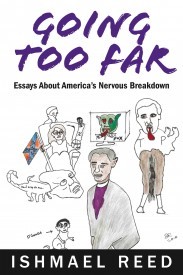Going Too Far: Essays About America’s Nervous Breakdown is the latest collection of non-fiction by Ishmael Reed, a poet, playwright, lyricist, novelist, essayist, and retired professor at UC Berkeley.
The first two of the book’s three sections consist mainly of polemical essays. Although these essays cover a great deal of ground, their arguments revolve around one central claim: racism continues to be a major and debilitating factor in American life. To counter those who think that America has entered a post-racial era, Reed cites numerous examples of anti-black stereotyping by politicians, government officials, media commentators, and the entertainment industry.

Going Too Far
Essays About America’s Nervous Breakdown
Ishmael Reed
Baraka Books
$19.95
paper
235pp
978-1-926824-56-7
Although Reed is a man of vast learning and accomplishment, this is not a strong collection of essays. Reed is correct in arguing that racism exerts a persistent and malign influence on American life; unfortunately, his arguments in favour of this conclusion are often shoddy. Most of the essays in this book are characterized by an excessively meandering style; Reed jumps from point to point without sustaining his arguments with sufficient care to be convincing, a glaring weakness in a book with such a broad array of ideological targets.
Going Too Far is teeming with ad hominem attacks, loaded language, sweeping generalizations, and other classic forms of unfair argumentation. The following passage, from an essay denouncing the acclaimed film Precious, is a case in point: “[W]hy doesn’t the Times open its Jim Crow Op-Ed page so that a member of Precious’s target, black men, as a class, could respond to this smear, this hate crime as entertainment, this neo-Nazi porn and filth?” Even readers who share Reed’s critical assessment of Precious will wince at this stream of crude invective. Unfortunately, such invective is a common feature of Reed’s book: he describes the television show The Wire as “neo-Nazi,” the NYPD as “America’s Gestapo,” Roger Ailes as Rupert Murdoch’s “Beelzebub assistant,” and Murdoch himself as “Goebbels I” (which prompts one to wonder what Reed would call the actual Joseph Goebbels).
Reed’s half-century literary career has been showered with honours and prizes, including awards for poetry. It is therefore sad to see such clumsy writing from an artist of his stature. With the exception of the previously cited quip about Malcolm X and Castro, the first two sections of this book are almost devoid of literary grace.
Thankfully, the third and final section of the book is more impressive. It consists mainly of interviews with notable black creative figures such as the jazz musician David Murray and the Somali-born writer Nuruddin Farah. There are also two interviews with Reed himself. Even in the earlier and weaker sections of this book, Reed comes across as someone who would make an enthralling conversationalist, an impression that is confirmed when he is asked about his own work and experiences. Reed is not only a good interviewee, but also a good interviewer, a skill especially evident when he asks the actor Lou Gossett Jr. about the racial obstacles he has faced during his illustrious career. This interview with Gossett is the book’s high point. mRb






0 Comments